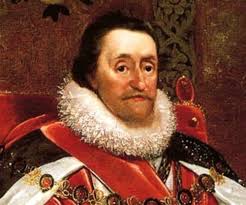
The Stuart king of of Scotland who succeeded Queen Elizabeth I as King James I of England in 1603, best remembered as the king who lent his name to the King James Bible.

Open Family Tree ☰ (Generation 5)
James was the only son of Mary, Queen of Scots and Lord Darnley, her first cousin. With the horrendous circumstances into which his father and mother fell into soon of his birth (Darnely was murdered—probably by Mary, and Mary was soon involved in a scandal, abdicated, placed under arrest, and escaped) James was brought up in the staunchly Presbyterian court of Scotland under the savage discipline of men like John Knox and George Buchanan and the horse-trading politics of the day; an unhappy childhood which he grew up to hate in every bit.
Scotland was then a quiet enough place for him to serve capably as a king, though he was always short of money. He naturally looked forward to the possibility of being king of England; him being the great-grandson of Margaret Tudor (Henry VIII's elder sister, who married James IV) and with Queen Elizabeth I remaining a virgin through all her long reign, he was politically a highly eligible candidate to succeed her, which he did as 'James I of England' in 1603.
Early in his reign he authorized the publication of the King James Bible. He also survived the great Gunpower Plot to kill him and replace him with a Catholic monarch. But his inadequacies soon showed and, under him, England turned into a second-grade power amidst one of the most dramatic periods in European history when it was embroiled in some of the worse religious wars she had, or would, ever see. At home, he did not understand and could not work with the English Parliament; a staunch believer in the divine rights of kings, he once said about the Parliament, "I am surprised that my ancestors should ever have allowed such an institution to come into existence." Internationally, he wished to play a peace-maker but possessed neither the dignity nor the smart to be respected as one (the fact that his son-in-law, Frederick V, Elector of the Palatinate, was a key belligerent in Europe added to his haplessness).
Possessing neither of courtly graces—one author describes him as "physically and by upbringing, the mos uncouth, ungainly, grubby, physically repulsive man for that moment in the history of these isles"—nor a happy marriage (to Anne of Denmark), James was also "immensely learned, widely read, fluent in tongues . . . incurably religious and a genuinely expert theologian . . . a Calvinist," but also given to homosexual trysts. He died in 1625 and was succeeded by his son, Charles I, who had even greater difficulty working with Parliament, and ended his life beheaded.

Resources & Further Reading:
☰ "The Purtan Conflict," being Sect.92, Chap.VII of Philip Schaff, Creeds of Christendom. Vol. I: The History of Creeds.
Peter Ackroyd, The History of England, Volume III: Civil War. London: Pan Macmillan, 2014.
Bryan Bevan, King James. London: 1990.
James Doelman, King James and the Religious Culture of England. Cambridge: Cambridge University Press, 2000.
W. B. Patterson, King James and the Reunion of Christendom. Cambridge: Cambridge University Press, 1997.

©ALBERITH
070819lch